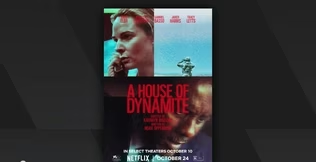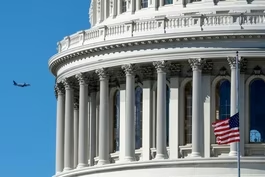
The impact of lowering the cost of weight loss drugs
Clip: 11/6/2025 | 7m 10sVideo has Closed Captions
The potential impact of lowering the cost of weight loss drugs
Millions of Americans will soon have direct access to popular weight-loss drugs at far lower prices than they pay now. That’s due to a deal announced between President Trump and pharmaceutical giants Eli Lilly and Novo Nordisk. William Brangham discussed the deal and its potential impact with Stacie Dusetzina of Vanderbilt University.
Problems playing video? | Closed Captioning Feedback
Problems playing video? | Closed Captioning Feedback
Major corporate funding for the PBS News Hour is provided by BDO, BNSF, Consumer Cellular, American Cruise Lines, and Raymond James. Funding for the PBS NewsHour Weekend is provided by...

The impact of lowering the cost of weight loss drugs
Clip: 11/6/2025 | 7m 10sVideo has Closed Captions
Millions of Americans will soon have direct access to popular weight-loss drugs at far lower prices than they pay now. That’s due to a deal announced between President Trump and pharmaceutical giants Eli Lilly and Novo Nordisk. William Brangham discussed the deal and its potential impact with Stacie Dusetzina of Vanderbilt University.
Problems playing video? | Closed Captioning Feedback
How to Watch PBS News Hour
PBS News Hour is available to stream on pbs.org and the free PBS App, available on iPhone, Apple TV, Android TV, Android smartphones, Amazon Fire TV, Amazon Fire Tablet, Roku, Samsung Smart TV, and Vizio.
Providing Support for PBS.org
Learn Moreabout PBS online sponsorshipAMNA NAWAZ: Millions of Americans will soon have direct access to popular weight loss drugs at far lower prices than they pay now.
That's due to a deal announced today between President Trump and pharmaceutical giants Eli Lilly and Novo Nordisk.
William Brangham has the details.
WILLIAM BRANGHAM: That's right, Amna.
The president said that people who pay directly for this class of weight loss drugs known as GLP-1s, that they would see considerable reductions in price.
The injectable versions would initially cost $350 a month and then drop to $250.
It would cost $150 a month for a soon-to-be-approved oral version.
This agreement also guarantees expanded Medicare and Medicaid coverage for many patients to use these medications.
The administration says the drugs will be available on the direct-to-consumer site known as TrumpRx when it's launched in January and via Medicare next summer.
Our White House correspondent, Liz Landers, spoke to Dr.
Mehmet Oz today.
He's the administrator of the Center for Medicare and Medicaid Services.
She spoke to him after the announcement about what this could mean.
DR.
MEHMET OZ, Administrator, Centers for Medicare and Medicaid Services: A hundred and fifty dollars for a pill or $250 for an injection, you'll start taking the medication, and then you'll drop 20 percent of your weight.
You'll have less hypertension, less diabetes.
Because of that, you'll have less heart attacks, less renal failure, less dementia, all the things that strip the vitality of the American people away.
WILLIAM BRANGHAM: Medicare patients who are covered will have a monthly co-pay of $50 and the government will pay less than $250 a month.
To qualify, Medicare beneficiaries must have certain medical requirements and conditions.
So, for more on this deal and its potential impact, We are joined by Stacie Dusetzina.
She's a professor in the Department of Health Policy at Vanderbilt University.
Thank you so much for being here.
Before we get into the specifics of this deal, what is your overall impression?
Is this a good deal for consumers?
STACIE DUSETZINA, Vanderbilt University: I think this will be a good deal for some consumers.
And there are a lot of details that we need to know about who will benefit, how much they will benefit, and when will they benefit.
But the negotiated price that was achieved results in it being a better deal for many people than what we have had up to now.
WILLIAM BRANGHAM: So let's talk first about this, the direct-to-consumer option.
This will be drugs sold on the TrumpRx Web site.
People can get injectables for $350 by January.
It'll then drop by another $100 over the next two years.
How meaningful a price decrease is that?
STACIE DUSETZINA: I think one of the challenging parts with the price decrease we're hearing about today is that it's not that large of a difference than what was already available to cash-paying patients through some of these sites.
So let's take, for example, the injectable drugs.
They will have a lower price for the first dose and then a slightly higher price for the next doses.
So I think, on average, for the injectable weight loss medicines, we're talking about $350 a month.
Now, that is a difference.
So, right now, they're roughly $500 a month.
So that could improve access for people who don't have coverage through their health insurance plans and who are willing to pay cash.
I think one of the challenging parts, though, is that many people can't afford that amount of money.
And we know from research that once the price reaches about $100 a month, a lot of people stop taking their medicines because that's a real breaking point for many people when they're thinking about how much they can afford to spend each month on medicine.
WILLIAM BRANGHAM: Right.
So, that could add up over the course of a year to quite a bit.
What about this $150-a-month oral pill, the one that's not yet approved?
STACIE DUSETZINA: My understanding is, the $150, again, is one of those initiation kind of prices, so almost like a teaser rate, where you start filling the medicine and then you get adjusted up to a higher price.
To the extent that you can see prices eventually get closer to $150, again, I think we will see more people taking these medicines, and especially in cases where your health insurance may never provide coverage.
For example, many people have health insurance plans today that don't cover weight loss as an indication, even though the drugs are available for weight loss specifically.
So, for that particular group of patients, they may find that the cash pay options are more affordable and the only way that they can access the drugs.
WILLIAM BRANGHAM: Let's pivot now to the Medicare and Medicaid coverage.
How much impact will those prices have for patients and for the system overall?
STACIE DUSETZINA: Yes, for the Medicare patients, what we're looking at is a stated price of about $245 a month, and that's the price paid by Medicare and patients together.
And they have also reported that Medicare beneficiaries who are filling drugs with that price point would be paying $50.
That would be a substantial change from today, and especially when you think about people who have indications that are not currently covered by Medicare.
So Medicare, when it set up the Part D prescription drug benefit, banned coverage of drugs for weight loss.
So the changes announced today provide a path for coverage of these medications for indications that have not previously been covered.
So if you were a Medicare beneficiary and you wanted to fill these medications, and you didn't have an indication that was covered, you would be paying the full price of the drug, literally thousands of dollars per month.
And so you can imagine that going from thousands of dollars to $50 is a huge change for Medicare beneficiaries.
WILLIAM BRANGHAM: What is in it for the pharmaceutical companies in this deal?
STACIE DUSETZINA: So the companies have made out quite well in this deal.
The first is that they avoid the threat of tariffs.
The Trump administration had threatened a 100 percent tariff on branded drugs.
So through these deals, they're able to escape that threat.
They also both receive priority review vouchers for getting their orally administered weight loss drugs approved through the FDA on an expedited timeline, which those were also awarded today.
And they get access to many, many more patients through expanding coverage through Medicare and Medicaid.
So it's, I think, a big win for the pharmaceutical companies today.
WILLIAM BRANGHAM: All right, that is Stacie Dusetzina of Vanderbilt University.
Thank you so much for helping us get through all this.
STACIE DUSETZINA: My pleasure.
After Kirk’s death, young conservatives carry on his message
Video has Closed Captions
Clip: 11/6/2025 | 8m 18s | After Charlie Kirk’s assassination, young conservatives work to carry on his message (8m 18s)
After Kirk’s death, young conservatives carry on his message
Video has Closed Captions
Clip: 11/6/2025 | 8m 18s | After Charlie Kirk’s assassination, young conservatives work to carry on his message (8m 18s)
'A House of Dynamite' sparks nuclear threat discussion
Video has Closed Captions
Clip: 11/6/2025 | 7m 55s | Netflix’s ‘A House of Dynamite’ sparks discussion about nuclear threats (7m 55s)
Judge criticizes immigration crackdown tactics in Chicago
Video has Closed Captions
Clip: 11/6/2025 | 5m 27s | Federal judge sharply criticizes immigration crackdown tactics in Chicago (5m 27s)
Nigeria rejects Trump's claim of targeted Christian violence
Video has Closed Captions
Clip: 11/6/2025 | 8m 19s | Amid rising violence, Nigeria rejects Trump's claim of targeted Christian persecution (8m 19s)
Travelers brace for disruptions as FAA cuts air traffic
Video has Closed Captions
Clip: 11/6/2025 | 6m 17s | Travelers brace for major disruptions as FAA cuts air traffic amid shutdown (6m 17s)
Where negotiations to end the federal shutdown stand
Video has Closed Captions
Clip: 11/6/2025 | 2m 3s | Where negotiations to end the federal shutdown stand (2m 3s)
Providing Support for PBS.org
Learn Moreabout PBS online sponsorship
- News and Public Affairs

FRONTLINE is investigative journalism that questions, explains and changes our world.

- News and Public Affairs

Amanpour and Company features conversations with leaders and decision makers.












Support for PBS provided by:
Major corporate funding for the PBS News Hour is provided by BDO, BNSF, Consumer Cellular, American Cruise Lines, and Raymond James. Funding for the PBS NewsHour Weekend is provided by...






